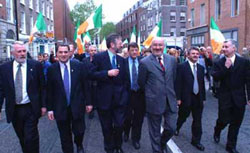 |
Irisch
Republikanische Solidarität
|
 |
POLICING TOPS AGENDA
In a week in which key Irish politicians visited the United
States to continue talks in Washington on St Patrick's Day, a
prominent newspaper advertisement placed by Sinn Fein sought to
draw attention to the continuing failure to enact policing reform
in the North of Ireland.
The party said it had refused to endorse the PSNI (formerly the
RUC) because it was not representative of the community and there
were no goals and timetables to achieve this.
The advertisemnt also pointed out that human rights abusers
remained; collusion with loyalists continued; fabrication of
evidence continued; there was still no democratic accountability;
and inquiries into the force's human rights abuses were still
being denied.
"Sinn Fein wants policing in the north of Ireland - but we demand
the policing service people are entitled to and will not settle
for the one the British are prepared to give," it read.
The PSNI Chief, Hugh Orde, who is also in Washington, said he
believed the Bush administration had noted "the substantial
changes" that have taken place in policing in the North.
The crime rate has fallen: "It is a litmus test. You don't
achieve those sorts of crime reductions without community
support.
"This is a recognition of our determination to deliver
first-class policing," said Mr Orde.
US President George W Bush's special adviser on the Six Counties,
Mitchell Reiss, urged the Sinn Fein leadership to begin a
"constructive dialogue" woth Hugh Orde.
Dr Reiss suggested that this dialogue should be a first step with
a view to having Sinn Fein join the Policing Board.
Dr Reiss was addressing a hearing in Washington on human rights
and police reform on Tuesday.
Sinn Fein policing spokes-man Gerry Kelly said that "meeting Hugh
Orde is not the issue".
He again called for the transfer of power on policing and justice
to Stormont. He also said plastic bullets, repressive
legislation, militarisation of police barracks and vehicles, and
the PSNI Special Branch were among the issues of continuing
concern.
"We took our position on policing to the electorate less than six
months ago, which included our decision not to participate in a
Policing Board that does not have the power to hold the PSNI to
account, and it was endorsed by the majority of nationalists."
Mr Kelly said Sinn Fein viewed the failure of the British
government to deliver on its commitments to implement the Patten
report as being the biggest obstacle to delivering the new
beginning to policing.
On Tuesday, US Congressman Chris Smith chaired a hearing on
Capitol Hill focused specifically on policing reform in Northern
Ireland.
Others who addressed the hearings included Police Ombudsman Nuala
O'Loan and representatives of human rights organisations.
The hearings were chaired by US Congressman Chris Smith, who said
that the lack of significant progress on some of the important
recommendations of the Patten Report, four years after the
release of the Patten report, was of "serious concern".
Rep. Smith said "unchecked Special Branch powers and unpunished
collusion -- hover like a storm cloud threatening a bright
future".
"These problems must be forcefully addressed so that real
policing reform can take hold - and maybe even lead the way -
regardless of the delays or setbacks in the political
developments in the north of Ireland," said Smith.
Sinn Fein's Martin McGuinness denied it was under pressure from
the White House to sign up to policing.
Mr McGuinness was speaking after meeting the US special envoy
Mitchell Reiss in Washington.
"I think we are speaking to an administration that understands
the vital importance of getting the Good Friday Agreement
implemented," he said.
Letzte Änderung:
20-März-04